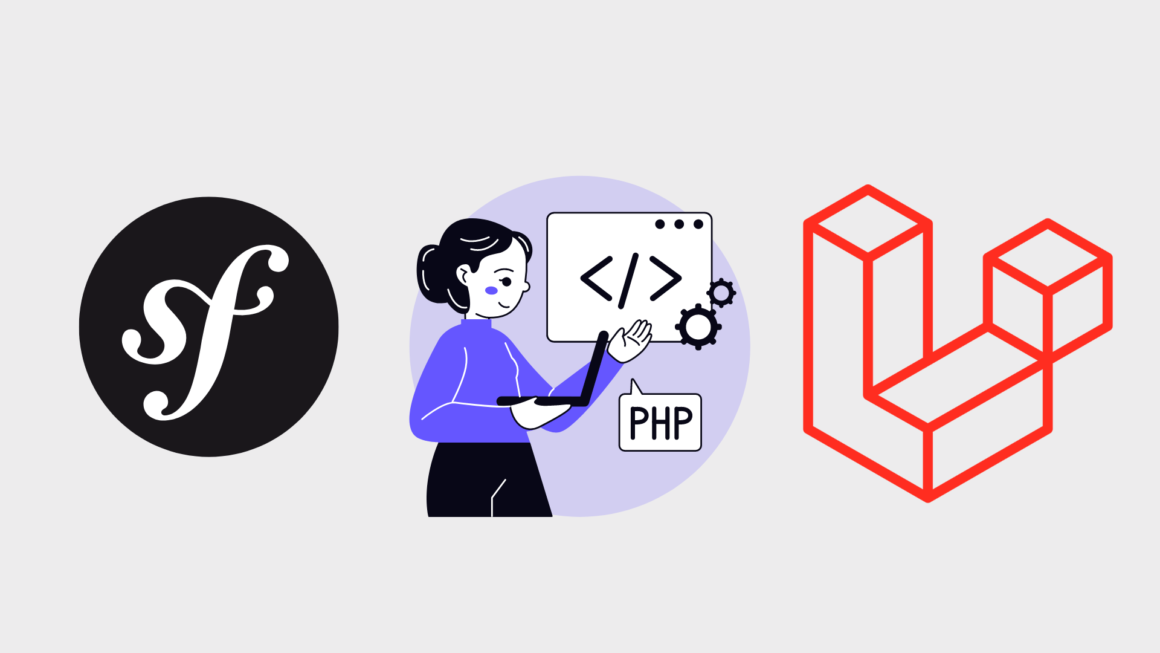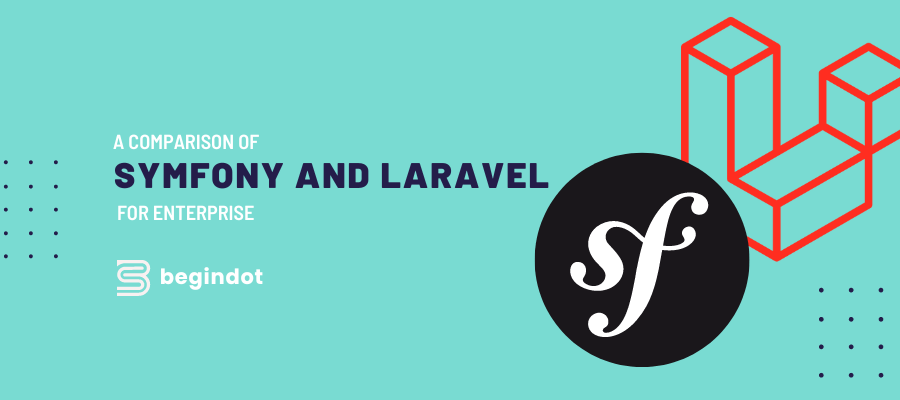When it comes to enterprise development, Symfony and Laravel are two of the most popular PHP frameworks.
But which one is better? In this article, we’ll compare them in terms of features, scalability, security, speed, and more to help you decide which one best fits your project needs. So buckle up: it’s time to find out all there is to know about the two trending frameworks!
Overview of Symfony and Laravel
Symfony is an open-source web development framework based on the components library. It is highly flexible and powerful, making Symfony ideal for enterprise applications. It also enables developers to build efficient and high-performance websites quickly.
On the other hand, Laravel is an open-source PHP web application framework that offers a wide range of features, such as routing, authentication, and more. It was created to make development more straightforward by simplifying the syntax.
Symfony VS Laravel: In-Depth Comparison

These are two of the most popular frameworks for enterprise development, and both have their advantages and disadvantages.
Let’s take a closer look and compare them in terms of features, scalability, security, speed, and maintenance costs and see, which one wins the race.
Features
Symfony has a wide range of features and functionalities that make it suitable for enterprise applications. It includes detailed documentation, an easy-to-use interface, support for multiple databases, and more. It also offers powerful debugging tools that help developers identify issues quickly and accurately.
On the other hand, Laravel delivers a rich set of features that make it an excellent choice for web application development. It includes an efficient query builder and ORM, a powerful command-line interface (CLI), built-in authentication and authorization systems, and more.
Scalability
When it comes to scalability, Symfony takes the lead. It is a highly extensible framework that can easily scale to adapt to new requirements. It supports multiple databases and offers powerful caching capabilities, which helps in scaling applications quickly and efficiently.
Laravel also supports scalability but not as well as its competitor. It allows developers to add more features and functionalities as needed, but it can be challenging to use Laravel applications for large-scale projects. You can visit website to learn more about the benefits of this framework in terms of scalability and beyond.
Security
Both Symfony and Laravel provide robust security features that protect applications from malicious attacks. The former guarantees authentication mechanisms such as API keys, basic authentication, session cookies, and more. It also offers several built-in security features such as data encryption and password hashing.
Laravel also provides strong security measures, including its authentication system, input and output filtering, as well as Cross-Site Request Forgery (CSRF) protection. Despite this, some specialists argue that Symfony’s security features have been tested more extensively and proven more reliable.
Speed
Symfony’s speed is impressive and makes it a great choice for enterprise projects. The framework enables developers to quickly build applications with its powerful caching capabilities and optimized codebase.
Regarding this factor, Symfony edges out Laravel due to the components library. Its components have been optimized for their performance, thereby making it faster than Laravel.
Maintenance Costs
When it comes to maintenance costs, Symfony takes the lead again. It is an open-source framework with a huge community of developers who are always ready to help. It also offers detailed guidelines that make it easy to maintain applications.
Meanwhile, Laravel also has well-developed documentation which makes it especially attractive to those who are new to frameworks. If you’re one of a kind, we would recommend you to start with Laravel as it’s overall easier to learn and utilize.
In addition, it has an active community of developers who are always willing to assist and numeric websites to visit and check out the information on them. All abovestated makes it a worthy competitor to Symfony.
Pros and Cons of Using Symfony VS Laravel
Pros of Using Symfony
- Symfony is a highly extensible framework that can easily scale to adapt to new requirements
- It contains powerful debugging tools and security features
- It is faster than Laravel due to the Symfony Components library
Cons of Using Symfony
- Symfony is not as well documented as Laravel
Pros of Using Laravel
- It offers a rich set of features, an efficient query builder, and ORM
- Laravel provides strong security measures, including its authentication system
- It allows developers to add more features and functionalities as needed
- It offers detailed documentation and guidelines for easy maintenance of applications
Cons of Using Laravel
- Laravel is not as fast as Symfony
Cost Comparison Between Symfony and Laravel
Today, it shouldn’t be difficult to find a custom enterprise software development company in USA or any other part of the world.
The cost of Symfony development services is often lower than that of Laravel-based projects. The former is also more affordable for maintenance since it has in-depth guidelines that make maintaining applications easy.
You may get more details on the pricing from an enterprise software development company.
Which One is Better for Enterprise?
Symfony is often the better choice for enterprise projects. It is a highly extensible framework with a high rate of adaptation to new requirements.
It also relies on powerful debugging tools, delivers strong security features, and is faster than Laravel due to the Symfony Components library.
In comparison, Laravel offers a rich set of features an efficient query builder, and ORM, but its scalability can be a challenge for large-scale projects.
Final Verdict on Which Is Better for Enterprises — Symfony or Laravel
Symfony is often the better choice for enterprise projects due to its scalability, reliability, security features, powerful debugging tools, and affordability.
However, Laravel can also be a good choice especially if you’re new to frameworks as it’s easier to utilize. Ultimately, it is important to consider the requirements of your project before deciding which framework you should use.









